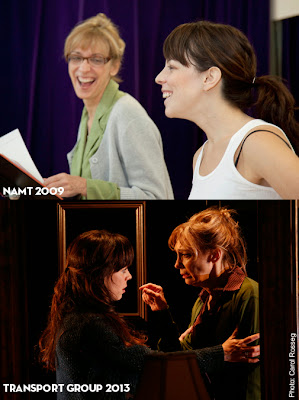On August 6th, I delivered a brand new
production that my husband and co-author, David Hein, and I had been working on
for nine months. At 6 lbs, 1 ounce, she was heavier than most of our scripts
(although nowhere near if you counted every draft). The delivery took 37 hours,
but thanks to a crazy rotating team of doctors, nurses, residents, doulas and
David, trying (in vain) to look calm and distract me by reading all the parts
from Peter And The Starcatcher, opening night was (relatively) painless.
We named her Molly.
Two days later, with a newborn in one hand and a keyboard in
another – with the wi-fi password from Mt. Sinai hospital – we delivered the
NAMT Act One 45-minute cut of our musical, Come From Away: Molly’s
sibling. This cut and the entire presentation at NAMT took no less of a stellar
team of professionals to accompany its birth.
We’d been working on Come From Away for longer than nine
months – we started writing it in 2011, when we traveled out to Newfoundland
to research it. Come From Away tells the true story of when thousands of
international residents were stranded in a tiny, Canadian community in
Newfoundland – and how the experience changed the lives of the passengers and
the people there. It’s an inspiring story of cross-border collaboration during
an international tragedy. We spent almost a month out in Newfoundland
interviewing countless passengers, flight crew, locals and more. We returned
home, continued to interview people across the world over Skype and then
finally started putting the pieces together in workshops at Sheridan College’s
Canadian Musical Theatre Project and then at Goodspeed Musicals’ Festival of
New Artists. Then we got the incredible honor of being accepted into NAMT’s
Festival… and did I mention I had just discovered through a series of (not so)
subtle signs and discomforts that I was pregnant?
As Canadian playwrights, we don’t know many people in the New York
Theatre world, so we considered it good fortune when







